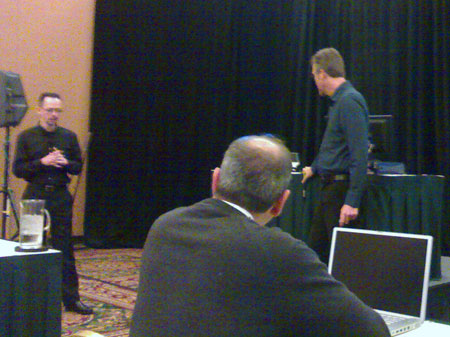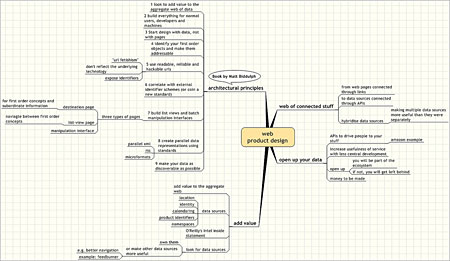I’m a nervous public speaker, and so when I was asked to talk at the Guardian Changing Media Summit, I started to scratch out some notes about specifically what I’d say about Social Media. When I’m talking, I never really use these notes verbatim, but it’s nice to have them should I get lost, and at least I know that the argument or arc actually makes some sense and that halfway through the talk I’m not going to suddenly realise that point x doesn’t actually so much lead into point y, but actually completely undermines it. Anyone who has ever written a university essay remembers that feeling, when the argument you’d sketched in your head is suddenly obviously untrue when you come to write it down. Now imagine if you were writing the damn thing as a performance piece in front of a few hundred people. How embarrassing.
Anyway, given that – as I mentioned a few days ago – some people got the wrong end of the stick when I said I didn’t know what Social Media was, I thought I’d post what I meant to say. So here it is – ludicrously extended and webified to make me sound more pompous, which can’t help but be a good thing:
Now I suppose I’ve been invited to talk at this event today because I’ve worked with and played around a great many of the areas that we’re talking about today. I’ve been writing my weblog – plasticbag.org – for nearly seven years now and I’ve been running an online community at barbelith.com for even longer. I’ve worked (briefly) as a journalist, represented magazines online with Time Out, ran or developed online communities for emap and UpMyStreet and spent the last two or three years working for BBC Radio and Music looking after a little team (with Matt Webb) exploring media annotation, social media navigation and consumption, wikis and recommendations.
I’m now lucky enough to work for Yahoo alongside some of the most successful and important of the new wave of social media sites – sites like Flickr, del.icio.us and upcoming. And yet – and I suppose this may be a relief to some of you – for the life of me I don’t know what people are referring to when they talk about ‘social media’. It’s not that I don’t understand the individual words – I know social stuff, I know media stuff. And it’s not like I’m unfamiliar with the things they’re talking about. I get weblogs and personal publishing, I get online communities and I remember the appearance of social software (and my fairly reasonable attempt to define it). But I don’t entirely get how social media has come to sit alongside these terms, or what specifically is different about it from the other social terminologies that we’ve had before. And when I hear people use it I get even more confused. For some people it seems to mean a subset of social software, for some people it seems to mean the same as social software. Worse still, for some people it seems to directly correlate to the web-based representation of social networks and nothing else. And for some others, who I cannot fathom at all, it seems to mean nothing but making your magazine or TV show or radio show slightly more interactive (potentially through the means of a web forum or e-mail).
Now I don’t claim to have the answer to this question and fundamentally language is a fickle creature and tends to mean no more or less than how people employ it, but in trying to work out precisely what I was supposed to be talking about today, I’ve made a stab at figuring this stuff out and putting a bit of a brief historical context around it. Maybe it makes sense. Maybe it doesn’t. I’ll let you decide.
Back before the last boom, the internet was fundamentally a communicative medium – a many-to-many conversational space of e-mail, mailing lists, Usenet and bulletin boards. This kind of activity was pretty much an early-adopter thing because it was a new form of communication. It’s worth remembering that while for many of you the idea of the social internet is a new thing, this isn’t a weird new growth on top of the internet, but something fundamental to its DNA – a connected many-to-many environment profoundly different from broadcast or publishing.
It was the popular arrival of the web that started the shift towards thinking of the internet as a publishing medium, and it was propelled in part by large companies using their enormous resources to put huge swathes of content online. Interestingly, this move was the thing that pushed the internet over the tipping point – publishing is something that people understand and can engage with. So the popularisation of the internet is probably directly related to this one particular and relatively constrained subsection of what it’s most useful for.
The age of social media then is probably about a fusing of these two ways of thinking – the communicative and the publishing/creative parts of the internet – into something new and powerful. It’s an environment in which every user is potentially a creator, a publisher and a collaborator with (and to) all of the other creative people on the internet.
Well so far, so User Generated Content. So what makes Social Media different? Well, one of the reasons is that the things that people are making aren’t just dumped into the world. Instead people are encouraged to use the content they’re creating – they own it and can employ it for renown or for social purposes within their interest communities or their social network. On Flickr many people upload photos from their cameras and mobile phones not just to put them on the internet, but as a form of presence that shows their friends what they’re up to and where in the world they are. Their content is a social glue. Meanwhile, other users are busy competing with each other, getting support and advice from other users, or are collecting photos, tagging photos or using them in new creative ways due to the benefits of Creative Commons licenses. Somewhere at the back of all of this is a concept of publishing, but it’s a one that’s been elaborated on and extended extensively.
There’s another different though, and I think it’s probably even more important. It seems to me that the other main feature of social media is that they’re looking at how each individual contribution can become part of something that’s greater than the sum of its parts, and to feed that back to the individuals using the service so that – fundamentally – everyone gets back more than they’re putting in.
These new services are about creating frameworks and spaces, containers and supports that help users create and publish and use all kinds of data from the smallest comment to the best produced video clip which in aggregate create something of fascinating utility to all. And if you want to know more about that, I’d recommend exploring del.icio.us or Flickr or Wikipedia. You’ll pick it all up quickly enough.
So social media then hasn’t really arrived as much as it’s always been there, waiting for the right set of circumstances to make it really blossom. These circumstances probably include boring things like web penetration, the new generation of users who have grown up with the internet, the widespread take-up of always-on broadband, standards-compliant browsers, a better understanding of addressability and links and search and more sophisticated approaches to handling media and interactions with the server.
And they’ve probably also been waiting for business models, which brings us back to the panel in question which is supposed to be about social media on the one hand and business models on the other. As I’ve said, social media is about helping individuals creating value for all. I’ll give you an example from a recent talk that my boss gave in ETech. He described how Yahoo is using Social Media with sites like MyWeb to aim at ‘better search through people’. Yahoo believes that we can make search better for users – and more financially rewarding for the company – by helping people collect, publish and share information, answers to questions, bookmarks and the like through Yahoo Answers, del.icio.us, Flickr and the like.
And of course social media generates an enormous amount of content, and content is content and can act as a platform for advertising. Traditionally media organisations are suspicious about placing ads around what can often be ‘bad’ user-generated content, but then the question is surely just how you can help surface the good stuff – and the best way you can do that is to work with your community. On Flickr, great pictures are seen by enormously more people than small personal or bad pictures – they have a concept of interestingness that surfaces pictures every day that are of extraordinary quality. Blog posts on average are pretty terrible, but the best blog posts are as good or better than anything you’ll find in the mainstream press.
And that’s just the beginning of the business models. People increasingly are comfortable paying for interesting services online. Get people using social media and hold back the functionality that costs the most to deliver (in terms of server load or storage or whatever) and a proportion of your users will put their money where their mouth is to go for the full experience completely and immediately. All they need is to feel that the service they’re paying for is worth the money. And of course if you’re building an environment in which people can do things with their content, some of the things they may wish to do with them open up other potential revenue streams – getting things printed, published, turned into books, projected onto the moon. Open that stuff up to them and I have no doubt they’ll run at it like a herd of bison.
Anyway, that’s me done. I’m sure I’ve bored you all more than enough, so I’ll just end up with another quick example of user-generated value that’s on the edge of social media. The other day I was rewatching a talk by Will Wright, the creator of The Sims talking about Spore, his new game and he was talking about how increasingly creating a new game required the production of more and more ‘content’, and that this was pushing up the costs of each new game and would eventually be unsustainable. He then talked a bit about The Sims 2 and how users were given the tools to create their own content for the Sims environment – actual objects that they could share with their friends and distribute through the ecosystem. And he mentioned that one of the sites that had manifested in this community of amateur creators had just recently celebrated its hundred thousandth user-created object. Imagine that! A hundred thousand bits of content created by a portion of the user-base, providing value to the game generators, fun to the normal users and prestige and satisfaction for the amateur creators. It’s a rare sweet-spot that makes everyone happy, and when you find them you know that they’re just at the start of something extraordinary. Virtuous circles like these have a tendency to expand and expand quickly. There’s a beautiful creative future ahead for everyone involved, but you have to be involved to experience it. So step forward, media owners! How can you fail!?



